
Romantic partnerships can be challenging even under the best of circumstances. Just consider the fact that 40 to 50 percent of marriages in the U.S. end in divorce. Communication problems, trust issues, and conflict can plague even the strongest relationships. However, when one partner is dealing with a mental disorder, relationships can become even more complicated.
We surveyed more than 2,000 people in the U.S. to explore the effects mental disorders can have on relationships, comparing responses from men and women to see where these experiences and concerns diverged by gender. Our respondents opened up about how forthright they are about their mental health, how supportive their partners are, and which insecurities they encounter.
A Snapshot of Mental Health
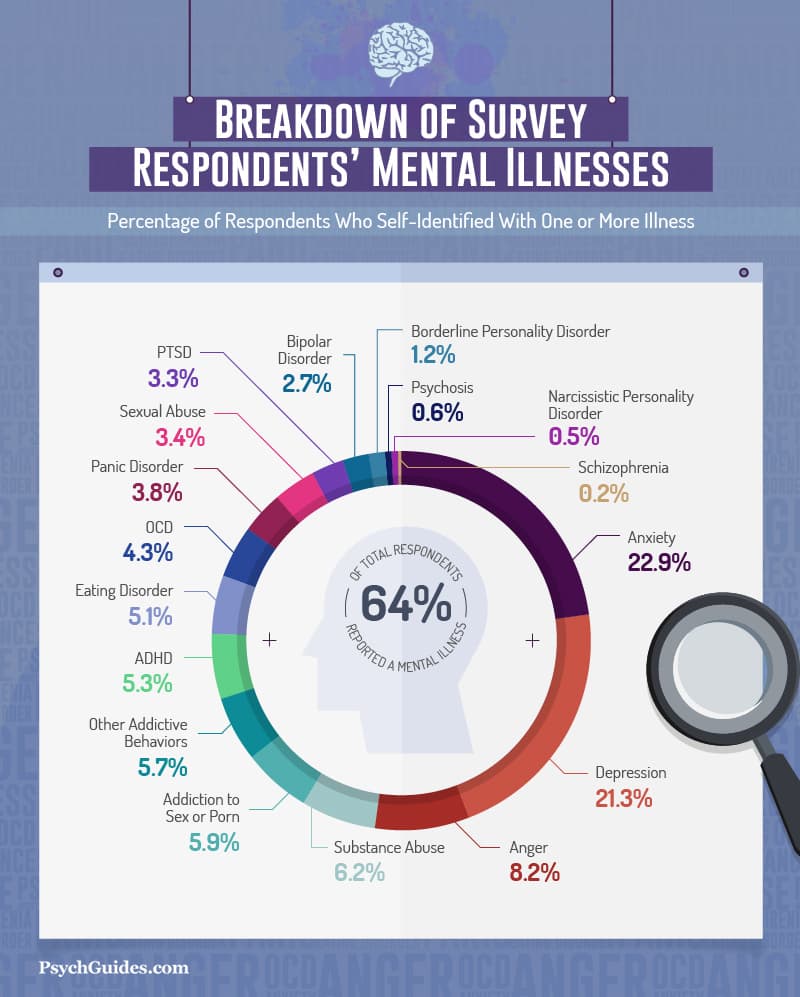
First, let’s get a closer look at our survey respondents. Among those who completed our survey, 64 percent reported having some type of mental disorder. Anxiety and depression were the most common issues among respondents, together comprising over 44 percent of reported mental disorders.
Anger was the third-most-common issue. A number of disorders comprised around 5 to 6 percent of mental disorders: substance abuse, addiction to sex/porn, other addictive behaviors, ADHD, and eating disorders. Fewer respondents reported OCD, panic disorder, sexual abuse, and PTSD.
Don't Face This Alone. Professional Online Therapy Can Help You.
Opening Up About Mental Health
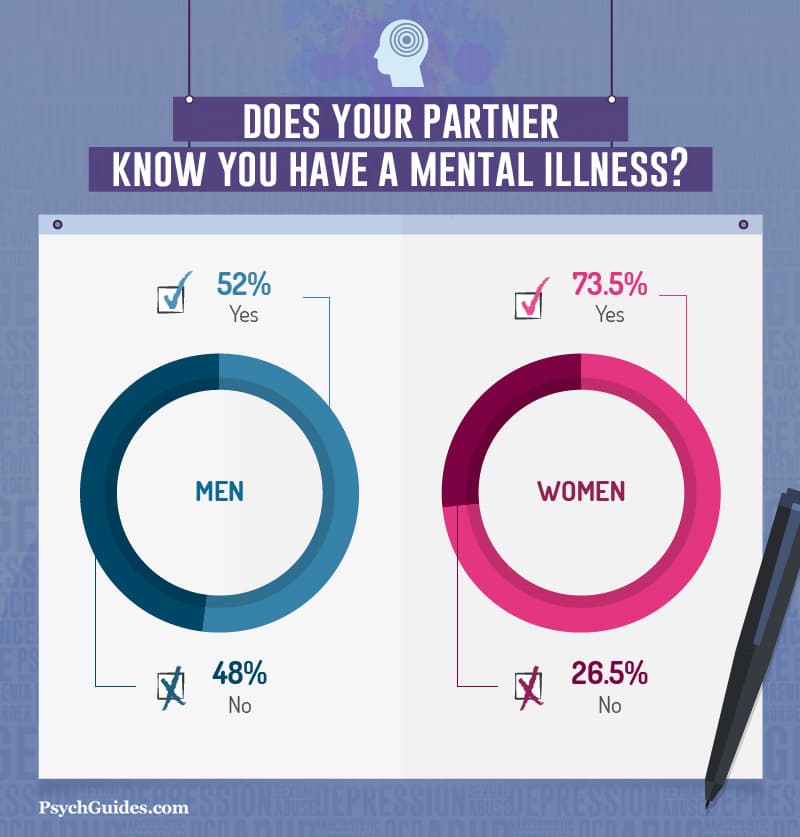
Unfortunately, even today there can be a stigma attached to mental health disorders, which can make people reluctant to tell even those closest to them that they have a mental health condition. We asked our respondents who have mental disorders whether they shared their diagnosis with their partner. Nearly three-quarters of women told their partners about their mental health issue, but only slightly more than half of men disclosed the information.
Relationship experts have found that healthy long-term relationships require honesty and trust, so it’s best to disclose a mental health disorder before experiencing an acute episode that could bring it into the open. If you’d like to learn more about navigating a relationship while dealing with a mental health disorder, visit PsychGuides.com.
Waiting to Share a Diagnosis
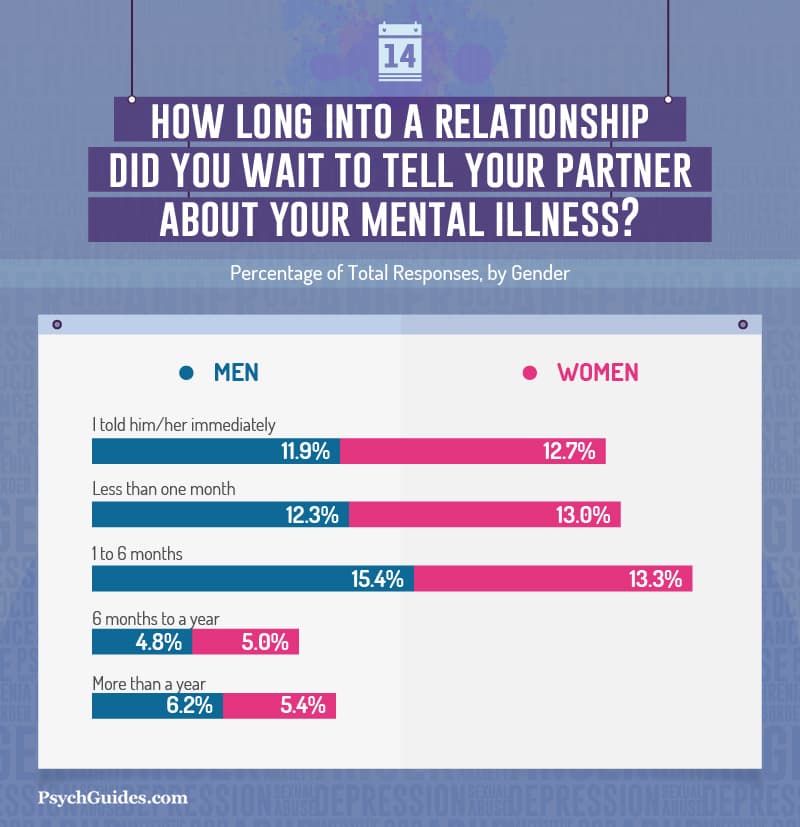
Next, we asked respondents who report having a mental disorder how long they waited to share their diagnosis with their partner. Nearly one-quarter of those surveyed disclosed the information right away, another quarter broached the subject in under one month, and nearly 29 percent shared between one and six months. Around 22 percent waited six months or longer. Overall, men tended to wait longer than women to disclose their diagnosis, perhaps reflecting an observed tendency among men to feel more stigma surrounding their mental health struggles.
Disclosing Treatment in a Relationship
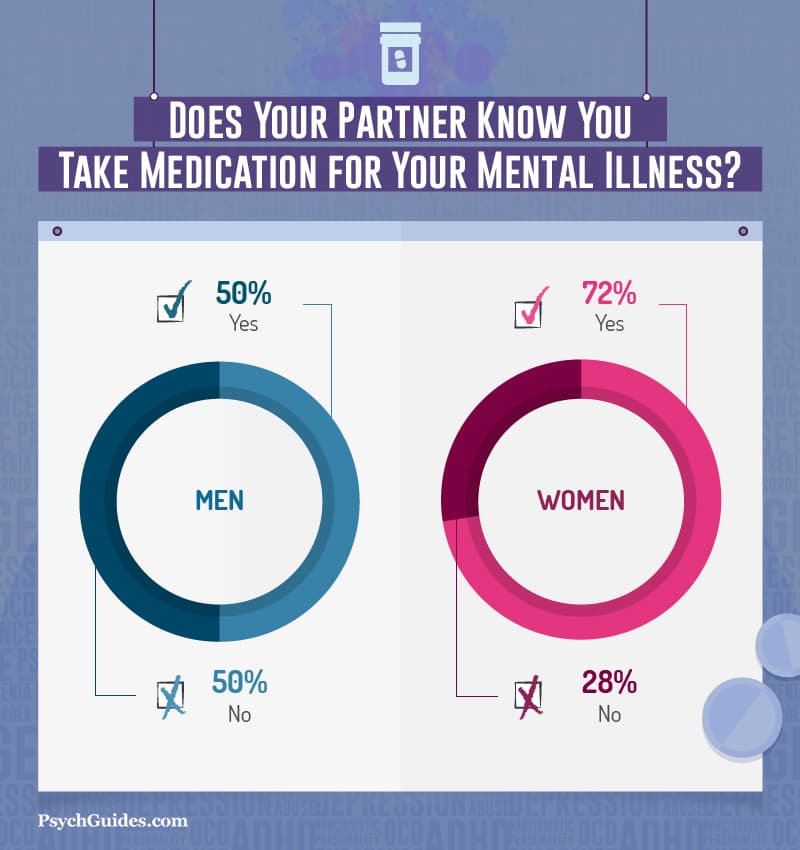
For people who struggle with mental health disorders, prescription medications can greatly relieve symptoms – especially when utilized in conjunction with other types of treatment. Among our respondents, exactly half of men told their partners about their use of medication, while just over 7 in 10 women disclosed the information. Medical treatment is a private issue; however our survey results indicate that, at some point, most people decide to discuss it with their partners.
Caring Partners and Mental Disorders
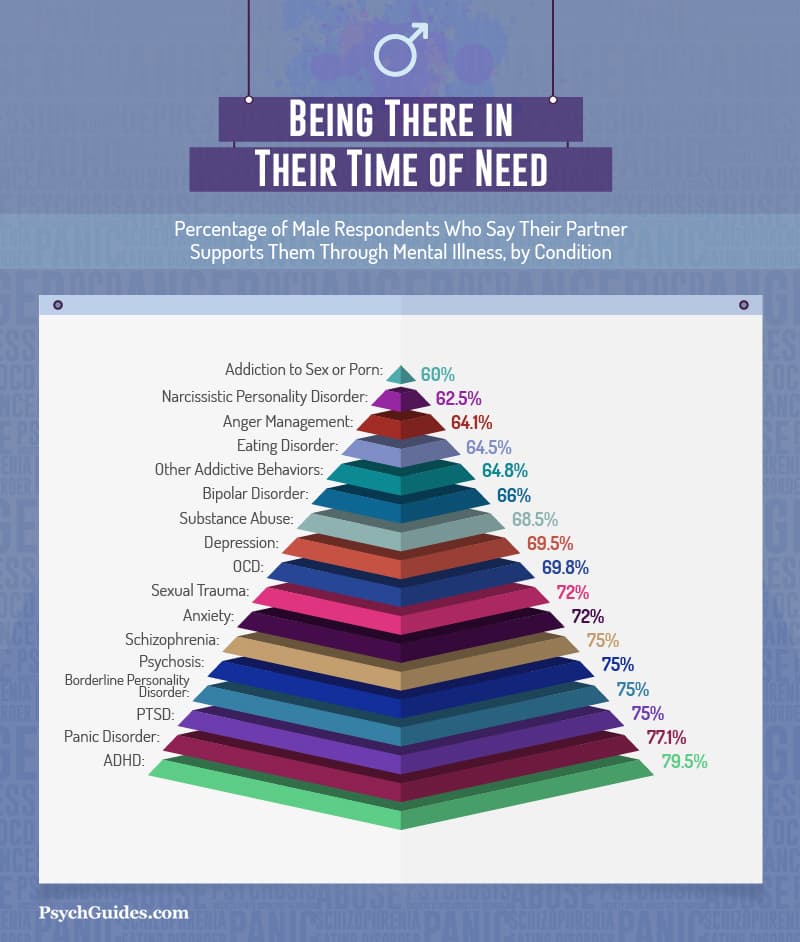
Mental health disorders encompass a range of conditions, each with unique challenges and symptoms. Support from loved ones tends to be a very important component of recovery. We asked survey respondents who have various mental health disorders whether or not their partners were supportive. Across the board, partners are more likely than not to provide encouragement – but the results vary widely between men and women.
Among men, those with ADHD (79.5%), panic disorder (77.1%), and PTSD (75%) were most likely to say that their partners supported them as they struggled with their mental health condition. Substance abuse, bipolar disorder, and other addictive behaviors were conditions less likely to be associated with support from a partner among men, while addiction to sex or pornography took last place, with 60% of men saying their partners were supportive of them. These findings suggest that partners may be more willing to be understanding of issues that, on the whole, may have less of an immediate impact on their lives, such as ADHD, while they’re more likely to struggle with conditions that can more severely impact their relationship, such as sex addiction and porn addiction. PsychGuides.com offers comprehensive information and help for those who are trying to understand and learn about these conditions and how best to approach this when a partner is struggling.
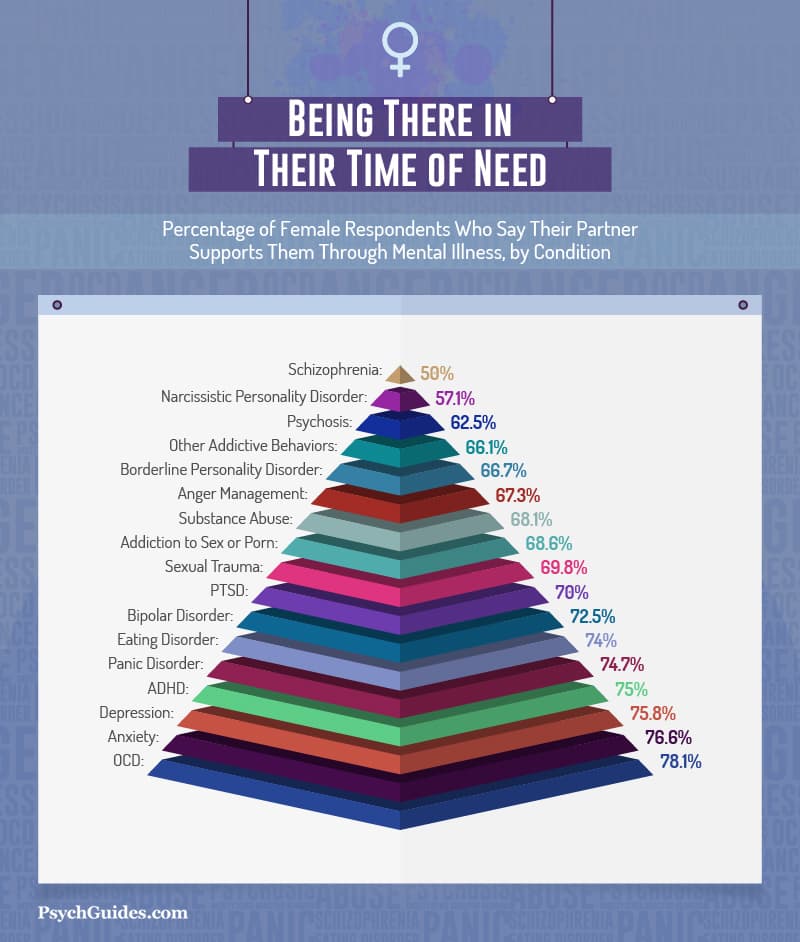
Women’s experiences of support from partners when coping with mental health conditions showed a distinctly different distribution. For women, OCD (78.1%), anxiety (76.6%), and depression (75.8%) were most likely to be associated with support from partners. Interestingly, while addiction to sex or porn ranked last among men in terms of receiving support from their partners, this placed near the middle for women: 68.6% said their partners were supportive of them in their struggles with this condition. At the same time, women were least likely to find support from partners when coping with schizophrenia, as only 50% said their partners supported them. Women overall appeared to be less likely than men to be be supported by partners when dealing with mental health conditions compared to men. This may show that women have a slightly greater willingness to help their partners in coping with mental health issues than men are to support their partners.
Mental Health and Relationship Issues
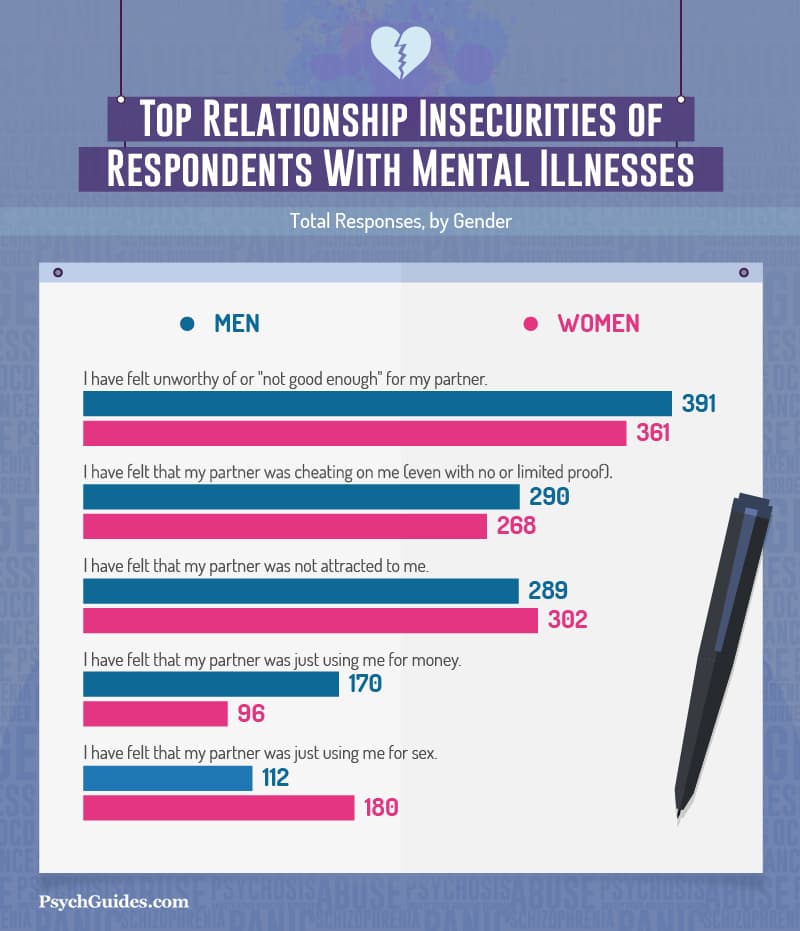
At some point or another, many couples struggle with insecurity issues in a relationship – for instance, one person may suspect infidelity or feel like their partner takes advantage of them. We posed potential insecurities to our respondents who reported having mental health disorders. Among our 2,140 respondents, 752 reported feeling like they weren’t good enough for their partner – with more men than women feeling unworthy.
As for potentially unfounded suspicions, 558 people thought their partner was cheating (again, more men than women). More men felt they were being used for money, while more women tended to think their partners used them for sex. Some mental health disorders can greatly exacerbate insecurities. For instance, relationship obsessive-compulsive disorder (ROCD), a form of OCD, can cause unwanted thoughts and feelings that prompt certain types of behavior. You can learn more about the symptoms of OCD at PsychGuides.com.
Privacy Invasions in a Relationship
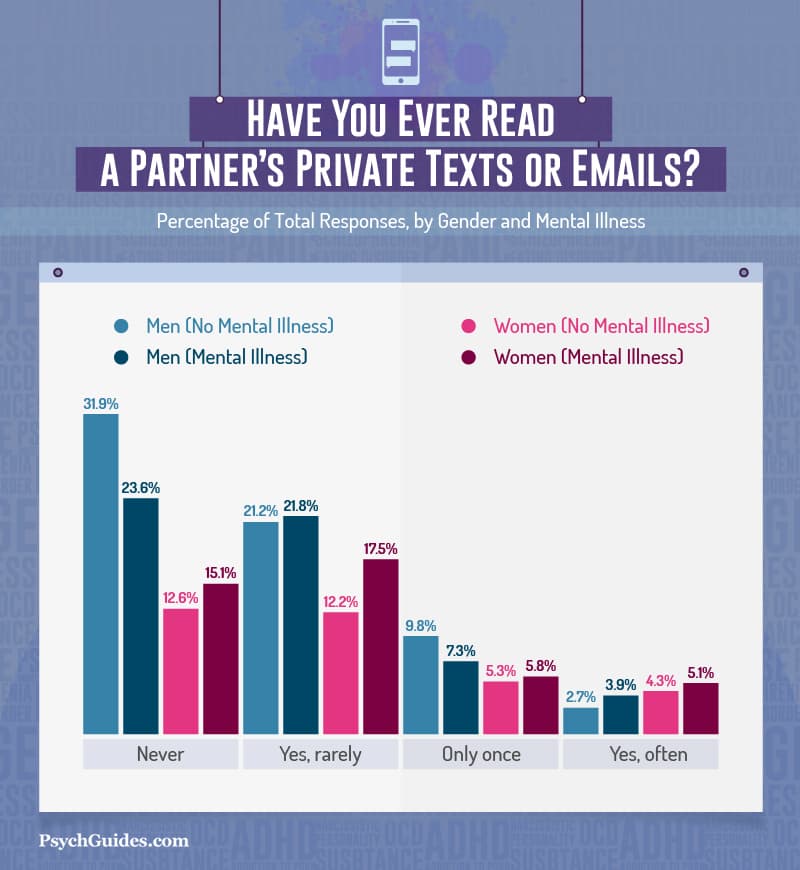
In the strongest relationships, couples opt for open communication rather than surveillance – but for some people, the temptation to peek at their partner’s private emails or text messages can be too much to resist. Among our respondents, people who snoop are in the minority.
Men are more likely than women to have never scrolled through a partner’s messages at all – but they’re also more likely to confess that they’ve snooped rarely or only once. Nearly 32 percent of men with no mental disorder say they have never snooped, compared with around 24 percent who have a mental illness. Roughly 13 percent of women who don’t have a mental illness say they have never snooped, compared with 15 percent who do have a mental disorder. Men or women who have mental health conditions are slightly more likely than those with no mental illness to report checking their partner’s messages frequently.
Pursuing a Fulfilling Relationship
Although a brand-new relationship can be magical, sharing a life with another person will never be all sunshine and roses. Most couples encounter various obstacles regardless of mental health status. When it comes to mental illness in relationships, our survey results reveal that men and women experience some key differences when it comes to communication, insecurities, and other issues.
Having a mental health disorder should not be a relationship deal breaker. In fact, as anyone who has ever struggled with mental health knows, you are still you – and tackling your health problems head on simply makes you stronger. At PsychGuides.com, you can find out more about various types of mental disorders and discover treatment options in your area. When you get the help you need, you can take better control of your mental health and experience the healthiest and most fulfilling relationships possible.
Methodology
We surveyed 2,140 people who were or have been in a romantic relationship about their unhealthy relationship behaviors and insecurities, then asked them if they self-identified with any of the following issues: anxiety, depression, anger, substance abuse, addiction to sex or porn, other addictive behaviors (gambling, shopping, video games, etc.), ADHD, eating disorder, OCD, panic disorder, sexual trauma, PTSD, bipolar disorder, borderline personality disorder, general psychosis, histrionic or narcissistic personality disorder, or schizophrenia.
Respondents had the option of checking all that applied. Out of our 2,140 respondents, 1,369 checked at least one of these disorders. We then asked these 1,369 respondents questions regarding how their mental illness has affected their relationships with their partners.





